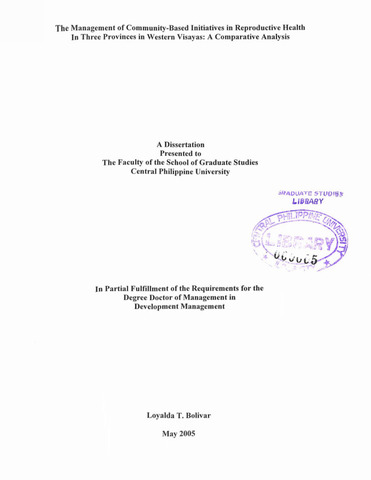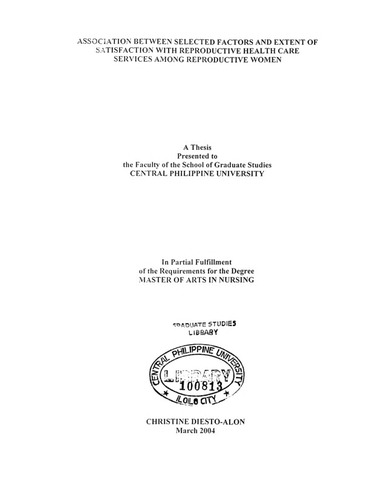| dc.description.abstract | This study was conducted to determine the demographic and psychosocial determinants of health-seeking behavior among commercial sex workers. Specifically, this study aimed to describe the demographics of the sex workers in terms of age, sex, civil status, educational attainment and family monthly income; describe the social characteristics of the respondents in terms of living arrangement, residence, and age of entry as sex worker and workplace; describe the psychological factors in terms of social stigma, accessibility of healthcare facility, and support; describe the health-seeking behavior of the commercial sex workers; determine the relationship between the demographics of the sex workers and the health-seeking behavior in terms of promotion, prevention and restoration; determine the relationship between social factors and the health-seeking behavior in terms of promotion, prevention and restoration; determine the relationship between the psychological factors and the health-seeking behavior in terms of promotion, prevention and restoration, and determine which among the demographics, social and psychological factors are the strongest predictor of health-seeking behavior.
This is a descriptive-relational research that utilized one shot survey design. This study involved all commercial sex workers (male and female) who had their regular weekly smear test at the Iloilo Social Hygiene Clinic. Data for the investigation was gathered using a researcher-made interview schedule. For the analysis of data, the study employed the descriptive statistic. To describe the data gathered, mean, frequency and percentage was used. In as much as total enumeration was done, no inferential statistic was utilized in this study. Rather, the Cramers’ V and Gamma were used to determine the existence and describe the relationship of the variables in the study.
In general, the respondents were 25 years old and older, female and attained high school level of education. On the average, they were earning between Php 10,001 - Php2000 per month. Most of them were living with their co-workers, and from outside Iloilo province. Most of them entered into sex work at 22 years old or younger and were them working at bars/videoke.
Majority of the respondents had experienced and received moderate stigma. This means that the extent effect of social stigma was substantial. Specifically these stigma can be classified in four clusters of reasons namely fear to be recognized, fear of rejection, fear to be treated unfairly and harassed, and fear of losing income or work.
As a whole, the respondents had high access to healthcare. This means that healthcare services were highly accessible to the respondents. Specifically, the respondents’ access to healthcare can be classified into four clusters of reasons namely access to Social Hygiene Clinic, services provided by health institutions, quality of service and provision of privacy and confidentiality.
Among the sources of support, majority of the respondents receive support from their families and most of the support that they receive is emotional support.
Overall, majority of the respondents had fair health-seeking behavior. This means that commercial sex workers had reasonable behaviors when it comes to how they seek help in order to maximize their health potentials by gaining knowledge about diseases most especially STIs and HIV/AIDS, prevent spread and acquisition of the disease and treatment of the disease.
In the promotive aspect, majority of the respondents had fair health-seeking behavior. The responses of the sex workers can be classified in to three clusters of reasons namely awareness of the services, willingness to promote health, and verification of the ideas and situations pertaining to health. This means that commercial sex workers had sensible behaviors and actions to actualize human health potential by making themselves aware and updated about the risk that they have in acquiring certain diseases.
In the preventive aspect, majority of the respondents had poor health-seeking behavior. The responses of the sex workers can be classified in to three clusters of reasons namely avoidance of illness, early detection of illness and prevention of the spread of disease. This means that commercial sex workers had absurd behaviors and actions to actively avoid illness, detect it early, and prevent the spread of diseases.
In the rehabilitative aspect, majority of the respondents had fair health-seeking behavior. The responses of the sex workers can be classified in to three clusters of reasons namely compliance to the treatment course, submitting one self for reassessment and tendency to self-medicate or self-management. This means that commercial sex workers had sound behaviors and actions to treat and rehabilitate upon being infected by a disease to restore its wellness. In general, the result of the study showed that the demographic factors such as age, sex, civil status, educational attainment and monthly income has unimportant to low association with health-seeking behavior. Furthermore, social factors such as living arrangement, residence, age of entry and workplace has irrelevant association with health-seeking behavior. Among the psychosocial factors, social stigma has rational association with health-seeking behavior.
On the final analysis, only sex, social stigma and support from others were found to be significant determinants of the commercial sex workers’ health-seeking behavior.
It is recommended that commercial sex workers should realize and learn about the dangers of their profession, its impact to the community and the threat it brings to society. Inasmuch as being humane is concern, they at least should consider looking for other jobs that would give them sense of worth by not using their own bodies to satisfy the demand for sexual pleasure. The local officials should work hand in hand with their people to implement and promote activities that will encourage commercial sex workers to participate actively in health education discussions so that they may update themselves with the latest trends and ways on how they can protect themselves. Moreover, in lectures and discussions, alternative livelihood should be included in the topic so that these sex workers would have a picture on what are other means and ways in which they could earn a living. The community should be made to realize that commercial sex workers should not be stereotyped and stigmatized but rather, as part of their social responsibility. Healthcare establishments, like hospitals and clinics, should evaluate their employees in terms of their attitude and prejudice towards commercial sex workers and how they are prepared to handle cases in relation to health concerns pertaining to the high risk in the nature of their work. | en_US |





